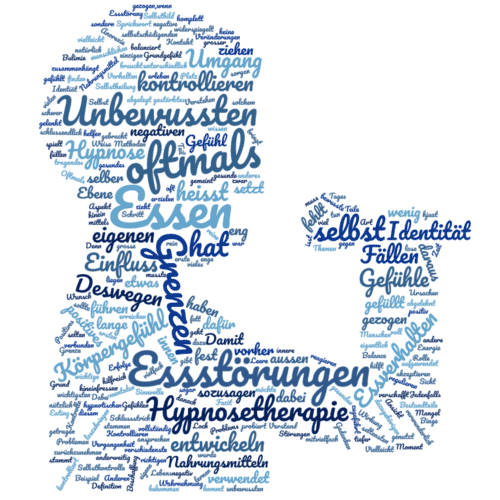- Mion Hypnosis
- Online Hypnosis Therapy
- Hypnosis applications
- Mental issues
- Physical issues
- Self improvement
- Hypnosis Zurich
- Jan Mion
- Contact
Use the effect of hypnosis to change your eating habits positively.



Treat the eating disorder at the root with hypnosis therapy of unconscious processes.
For a long time, food was one of the most important components of human life. In the past, a large part of the day had to be spent on the procurement of food. For this reason it is not surprising that food is also related to identity.
There is even the saying "You are what you eat". Maybe that's why eating disorders are often hard to get rid of. In any case, in the hypnotic view of eating disorders, identity and self-esteem play an important role. If the associated feelings are negative, they are often balanced by the unconscious with food.
The inappropriate eating behavior is thus often the attempt of the unconscious to create balance in emotional one-sidedness. Especially clients who are convinced that their food consumption has only something to do with e.g. stimulus of sweets are often surprised how deep it can go.
This means that various negative feelings can be directed towards food or control over food. Not infrequently, these also originate in a negative self-image or body image.
Only in the rarest of cases does this concern the food itself. That is why hypnosis therapy is used more deeply for eating disorders.
One's own identity is not only felt internally, but is also carried to the outside world.
This means that appropriate boundaries must also be drawn for the definition of one's own identity.
If your own limits are drawn too tight or too loose, this can lead to problems. Because if you control yourself too tightly or too little, this can often have an influence on your eating behaviour.
With bulimia or binge eating, for example, in certain cases it is the case that those affected control themselves firmly until the unconscious takes over completely and simply stuffs in the food.
In many cases, this is due to the fact that one has to take oneself back and should not draw boundaries for "the others". With anorexia, in many cases the food is also used to gain control. So, so to speak, too narrow limits are drawn when the influence is missing elsewhere.
If you draw the line too narrow, it can also lead to the feeling that you are missing something. This lack or inner "hole" is then often filled with food. This may be useful in the first moment, but if this becomes the only way of dealing with oneself, it can develop into an eating disorder.
This self-control can, of course, also be an attempt to control how others react to you. Often the "I don't want to get fat" is actually the desire not to be rejected. This aspect of eating disorders also often has to do with one's own limits. Being able to stop doing things that are not good for you is an important skill. Thus, certain treatments of an eating addiction also have a similarity to treatment of addiction with hypnosis.
As different as eating disorders can be, the causes often lie in the unconscious. This means that the conscious mind has little influence on these issues. This also means that the pure understanding of the problem often does not help much.
That is why hypnotherapy focuses on changes at the level of the unconscious. On this level of feelings the first step is often to develop a positive, strengthened feeling for oneself. The methods of hypnosis can address these unconscious parts, which ultimately regulate the eating behaviour.
In order to draw a line under self-damaging behaviour, you should also know what you need. In this way, the energy that is used to control yourself can be used to achieve something positive.
A positive, supportive basic feeling can ensure that what was previously supplied from the outside, now comes from the inside. Experiencing oneself as complete and complete can help to develop a healthy body feeling.
This often makes room for mental self-healing. The negative thoughts about oneself can thus be discarded many times.
The contact with the unconscious is also helpful to be connected with your feelings. Learning to accept these helps to avoid having to shove them down with food. They fill up, so to speak, the emptiness that was previously filled with food.
In principle, hypnotherapy can be a very good help for eating disorders in order to make decisive changes on a subconscious level. Where other treatment methods may not have achieved the desired results, it is often still possible to initiate changes with hypnotherapy.
Hypnotherapy can be a valuable tool in the treatment of anorexia nervosa. The unconscious mind is invited to transform the distorted body image and negative thought patterns associated with extreme thinness into a healthy form.
Therapists can work with sufferers to cultivate a healthier self-perception and thus promote a more balanced diet. It also aims to promote self-care and a realistic view of body image.
In the context of binge eating, hypnotherapy can help to address the underlying emotional triggers and habitual patterns that lead to compulsive overeating. Through hypnotic suggestion, hypnosis aims to break the cycle of compulsive eating and develop healthier coping mechanisms for stress and emotions. By encouraging a mindful and present approach to eating, hypnotherapy can help to reduce the frequency and intensity of binge eating.
For individuals struggling with selective eating disorder (ARFID), hypnotherapy can help reframe aversions and fears associated with certain foods. By exploring the unconscious origins of these aversions, therapists can guide sufferers towards a more open attitude towards trying new foods.
Positive suggestions and images can help to alleviate the discomfort associated with certain textures or smells, allowing a gradual expansion of the individual's food repertoire.
Hypnotherapy can be a supportive tool in the treatment of binge eating or compulsive overeating. By exploring the emotional roots of eating behavior, therapists can help sufferers gain a deeper understanding of their relationship with food. Hypnosis can lead to healthier thought patterns, promote mindful eating behaviors and help sufferers develop strategies to manage cravings and make more conscious food choices, contributing to more balanced and sustainable eating behaviors.
Hypnotherapy can be a valuable part of the comprehensive treatment of bulimia nervosa. By exploring the subconscious mind, hypnosis helps sufferers overcome the complicated emotional challenges associated with binge and purge. It focuses on developing healthier coping mechanisms, reducing the frequency of binge eating and promoting a positive relationship with food and body image.
Due to the effect in the unconscious, hypnosis can achieve great success in eating disorders. Even with those people who have already tried many other things. A healthy approach to food often reflects a healthy approach to oneself. That is why hypnosis therapy can bring food into a sensible balance. Who realizes that it is usually not only about food, but about emotions also comes away from the clumsy attempt to lose weight with hypnosis.
